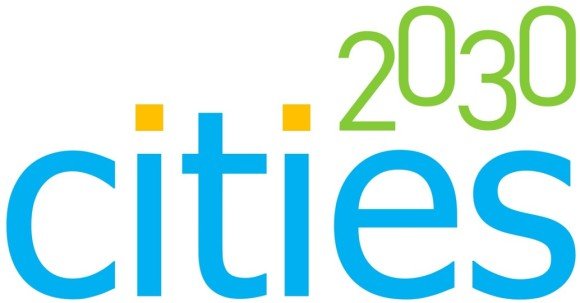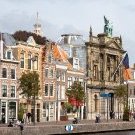Living: Innovation action plan
1. CRFS vision 2030 and challenge statements
CRFS 2030 vision: Haarlem aims to be a circular city by 2040. In the Sustainability Roadmap (Chapter 8, Chain Responsibility) Haarlem has targets that are at least necessary for this purpose until 2040. By 2030, Haarlem wants to have reached 50% off the habitants with information about more, local, organic food.
By 2030, 50% of the companies in Haarlem will have become familiar with a circular food system due to the programs of the municipality. In addition, by 2030 every neighbourhood will have some form of urban agriculture/vertical agriculture. Local food cooperatives are activated and 50% of Haarlem residents are familiar with these cooperatives, including core campaigns of the municipality. In each district, residents have developed bottom up initiatives, supported by the municipality. Through campaigns and plant-based menu/activities, organic food is stimulated and encouraged.
2. Collaboration with stakeholders
Together with initiatives and entrepreneurs: Haarlem works closely with (residents) initiatives and entrepreneurs to realise a sustainable food system. These initiatives have started various projects to, among other things, increase biodiversity. In the coming years we will intensify cooperation with initiatives in Haarlem. Regular consultations and meetings are organised. Two colleagues from the municipality are a direct point of contact for the Living Lab and we set up projects and collaborations together.
Together with ‘Voedsel Verbindt’ (Food connects): Food Connects is an activating platform that focuses on a sustainable, regional and circular food system. Food Connects offers an overview, puts on the agenda, activates and connects. The aim is a robust and healthy Amsterdam Metropolitan Area and surrounding agricultural areas. LL Haarlem participates in the working group ‘Our Circular Food Economy’. Partners include the municipality of Amsterdam, the province of North Holland and the province of Flevoland.
Together with the City Deal Sustainable and Healthy Food Environment: A City Deal is a thematic collaboration in which municipalities, central government, private parties, knowledge institutions and other organisations work on an equal basis on innovative solutions for complex urban challenges. Through three tracks, the City Deal focuses on a healthier and more sustainable supply in the streets, healthy and sustainable food routines and the promotion of local food and the short chain. Living Lab Haarlem focuses on track 3, stimulating local food and the short chain. Haarlem is investigating whether the Amsterdam ‘Farmers for Neighbours’ project can also land in Haarlem. In addition, new models are being tested to stimulate local food – an example is the cooperative Food Hall. In Cities2030, an action plan will be drawn up and support tested to be able to realise this.
3. Living Lab resources
Haarlem needs capacity and resources to promote the circular food system. In the new coalition agreement (policy of the municipality) resources have been made available up to and including 2026. Through the policy ‘Roadmap Sustainability’, the budget and capacity will grow in the coming years to realise a circular food system. In addition, Haarlem works closely with the region. A subsidy has been requested from the province to stimulate the short chain in the coming years. We also work together with Rijkswaterstaat (government body), who previously made the budget available for the frontrunner group Circular Restaurants.
4. Living Lab experiments
Oro Wolkorrel (Oro wool) granules make plant food granules from wool for which there is no other destination. In Cities2030, Oro is exploring opportunities for scaling up. The aim is for the residual wool product to be used on a much larger scale as plant food. Contributes to ‘protect and preserve natural resources’. Working groups: Waste and processing. The hypothesis and assumption is that grain can be used on a larger scale in urban agriculture. Experiment starts in October 2022 and ends in March 2023.
De Plukweide (Picking flower garden) grows oyster mushrooms on wood chips (residual material) from the Maak site as a basis for compost. In addition, they are conducting tests for an even more fertile compost with worms and food leftovers in Bokashi containers. The aim is to stimulate biodiversity on land/fertile soil. Contributes to ‘Protect and preserve natural resources’ and ‘Enhance circularity and local food belts’. Working Groups: Waste, Ecosystem Services, Production (flowers for honey). The hypothesis and assumption is that this compost ensures better soil quality and more production of flowers and biodiversity. It is also assumed that residual flows from other stakeholders can be put to good use. Experiment started in May 2022 and will end in November 2022.
The ‘Wilde Oogsten’ (Wild Harvest) is investigating how biodiversity can be increased by means of vegetable garden techniques (regenerative agriculture) and cooperation with livestock farming (for natural grazing and tillage of the land). This soil is more resistant to drought or heavy rainfall. The aim is to stimulate biodiversity on land/fertile soil. Contributes to ‘Protect and preserve natural resources’ and ‘Enhance circularity and local food belts’. Working Groups: Waste, Ecosystem Services, Production. The hypothesis and assumption is that this compost ensures better soil quality and more production of vegetables and biodiversity. It is also assumed that residual flows from other stakeholders can be used usefully. Experiment started in May 2022 and will end in November 2022.
‘Wij telen groente’ (We grow vegetables) and farm ‘De Herkomst’ (The Origin) puts pigs for natural grazing. The pigs are ultimately slaughtered and consumed locally, for example by the leading group Circular Restaurants. In Cities2030, it will be investigated whether pigs can be used for natural grazing in more places in Haarlem. The aim is to stimulate biodiversity on land/fertile soil. Contributes to ‘Protect and preserve natural resources’ and ‘Enhance circularity and local food belts’. Working Groups: Waste, Ecosystem Services, Production. The hypothesis and assumption is that this compost ensures better soil quality and more production of vegetables and biodiversity. It is also assumed that residual flows from other stakeholders can be used usefully. Experiment started in May 2022 and will end in November 2022.
Foodlab uses the ‘Train the trainer’ program to train neighbours with a passion for cooking to give children sustainable and healthy cooking classes in their own neighbourhood. The aim is for more children to have access to sustainable and healthy food and to develop an affinity with it. The assumption/hypothesis is that this training program works like an oil slick and that more and more people will participate. Contributes to ‘Secure healthy and sustainable food’ and ‘Develop food culture and skills’. Working Groups: Inclusion, equity and Consumption. Experiment started in August 2022 and will end in February 2023.
Ground 8 is conducting a short research into support for a Cooperative Food Hall: a place where a group of people (1000) buy local and sustainable food and are also co-owners (preferably in Schalkwijk). Aim: research into support for a Cooperative Food Hall. It is assumed that there is sufficient support. Contributes to ‘Secure Healthy and sustainable food’, ‘Develop food culture and skills’. Working groups: Consumption, Ecosystem services and Inclusion, equity. Experiment started in August 2022 and will end in February 2023.
Orbisk: Through an Orbisk pilot with five restaurants from the frontrunner group of Sept/Nov 2022, their food waste was measured using a software monitor. Aim is to reduce food waste. Contributes to ‘Secure Healthy and sustainable food’, ‘Develop food culture and skills’. Working groups: Consumption and Waste. Experiment started in September 2022 and will end at the end of November 2023.
Food Waste Challenge: Haarlem Food Future and Rabobank are starting a Food Waste Challenge where restaurants put on their food waste. After a baseline measurement, in which the food waste of a week is measured, it is determined where the most profit can be made. Then, with the help of the Wastewatchers, restaurants will work to reduce food waste. After the challenge, food waste is measured again. In Brabant, more than 54% less food was wasted. Aim is to reduce food waste. Contributes to ‘Secure Healthy and sustainable food’, ‘Develop food culture and skills’. Working groups: Consumption and Waste. Experiment started in September 2022 and will end at the end of November 2023.
The monitoring process takes place during the experiment. Results of the experiments are monitored by means of a form before, during and after the experiment.
In addition, there is interim vocal contact with the stakeholders about the progress. Results are presented in several meetings.
5. Other Living Lab's measures
We make the policy with actions to achieve the goals in our vision. A circular economy action program will follow at the end of 2022. This is a practical translation of the goals from the Sustainability Roadmap. The Action Program encompasses the actions necessary up to and including 2025 to achieve these goals.
6. SMART Goals
Prevent/reduce food waste. Promoting sustainable and healthy food choices. Stimulating biodiversity through urban farming initiatives.
7. Communication, dissemination and exploitation
There is a registration form with an interim monitoring and a final monitoring of the results. Several meetings are organised with stakeholders where they present their results (first one is Oct 14).
Disseminate results: Through the news and social media channels of the municipality of Haarlem. Website of HFF (partner) and the page Haarlem Circular City. A campaign will start next year to stimulate the circular economy in Haarlem. Making the food chain more sustainable is one of the most important partners.
Haarlem has been investing in this network of stakeholders for a number of years. Thanks to Cities, collaborations have been intensified and projects accelerated. Cooperation is aimed at an ecosystem for the long term, we will continue with this after Cities2030.
8. Continuity- and scale-up measures
Continuation is guaranteed in our policy and the lessons learned from the projects and experiments are included in order to achieve our goals for the coming years.
Haarlem needs capacity and resources to promote the circular food system. In the new coalition agreement (policy of the municipality), resources have been made available up to and including 202610. Through the policy ‘Roadmap Sustainability’, the budget and capacity will grow in the coming years to realise a circular food system. In addition, Haarlem works closely with the region. A subsidy has been requested from the province to stimulate the short chain in the coming years.
9. Risk assessment
The municipality of Haarlem is dependent on the political choice to focus on a circular and sustainable food system. This is guaranteed in our policy for the next four years. After new elections, a different political prioritisation may arise.
Haarlem aims to be a circular city by 2040. A sustainable and circular food system is essential in this regard. The expectation is that the situation will only become more urgent and higher on the agenda. We therefore consider the risk of a different political prioritisation to be relatively small.
Haarlem continues to emphasise the need for a sustainable and circular food system in our policy.

.jpg.f0771eb0c71e9b57e9b6a9f7fe189c04.jpg)
